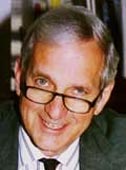Editor's Column
Celebration and Thanksgiving

Martin McKneally
|
Over 1500 "friends for life",
admirers and family filled Saint
Paul's Anglican Church on Bloor
St. on May 14th. Everyone was
talking, smiling and clearly
proud to be at the aptly named
"Celebration and Thanksgiving"
for the life of Dr. Robert Bruce
Salter. We celebrated his heroic
vision of life, his courtly manners
and generous spirit. John
Wedge recalled Bob's missionary work, his remarkable
scientific contributions that helped millions, and his
rebellion against the rigid dogma of strict immobilization
of fractures. We learned that Bob wore the machine that
he invented to bed himself, as the first participant in the
many studies of continuous passive motion he conducted
to develop this remarkable treatment. He spent hours
writing letters to advance the careers of his 390 fellows.
In the words of his former student, Alvin Lin, he couldn't
help himself from striving to do more. His last day of
work at the Hospital for Sick Children was on March,
30th, six weeks before he died at the age of 83. See also
The Surgical Spotlight, Spring 2010.
In contrast, the July issue of the Journal of the American
Medical Association contains an editorial by UCLA
geriatrician David Rubin, describing an increasingly
common tragedy. His functionally impaired 89-year old
patient had required a 24-hour per day caregiver - before
suffering a massive stroke. She was subsequently tortured
to life with intensive care. Her son insisted on this course
of treatment, confusing his hopes with his filial duty,
and ignoring the cost of this degrading array of medical
services. "For her, it was the age of hopelessness, the
worst of times. Because of her son's decisions she was
maintained in a state that most would not want."
In the August 2nd issue of the New Yorker magazine, the
able surgeon scientist and author Atul Gawande chronicled
the last days of other tragic patients, many of them
from his own practice. He dissects the language that he,
like all
|
of us use to encourage and reassure our patients.
"85% of patients respond, some of these responses can
be long term". His vivid language is arresting. "I am running
a warehouse for the dying", says a grieving intensivist.
Dying is no longer a brief process and "last words
hardly seem to exist anymore". Atul describes his own
mistakes in discussing terminal illness. "When asked
'Is she dying?' I didn't know how to answer the question".
Available at http://www.vimeo.com/12492922,
this excellent exposition ends on a positive note, describing
his surprising and enlightening experience visiting
patients on rounds with a home hospice nurse, and an
optimistic account of how the enlightened residents of
LaCrosse, Wisconsin manage the issue of terminal illness
- 85% of them have written advance directives.
|
Our medical system is excellent at trying to stave off
death with eight -thousand-dollar-a-month chemotherapy,
three-thousand-a-dollar-a-day intensive care,
five-thousand-dollar-an hour surgery. But, ultimately,
death comes, and no one is good at knowing when
to stop.
As for the last words, they hardly seem to exist anymore.
Technology sustains our organs until we are well
past the point of awareness and coherence.
Atul Gawande
|
Demographers describe the "rectangulation of the life
curve" by advances in medicine. Arthroplasty, stents,
pacemakers, pharmaceutical science and other advances
all help to preserve the quality of our lives, and spare
us the slow declining curve of disability and discomfort
associated with chronic illness in an earlier era. As fortunate
beneficiaries of these medical advances, we should
be grateful, and apply them wisely.
When death comes to call, the interview should be
brief. Paraphrasing Dylan Thomas, we should then "go
gently into that good night", without prolonging "the
dying of the light". Bob Salter set an example for us
all, living a full and productive life, that ended shortly
before a joyous funeral of thanksgiving. I plan to celebrate
and give thanks for my life at an Irish wake while
I am still alive to enjoy it, followed by a grateful and
willing departure.
|